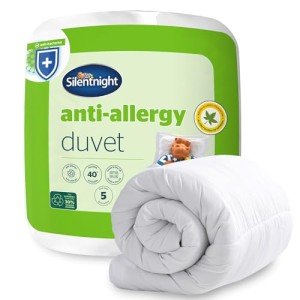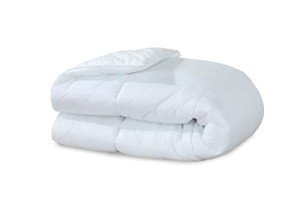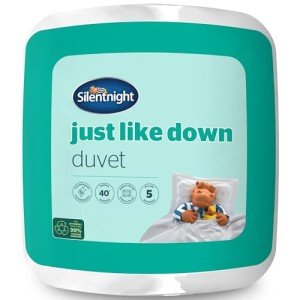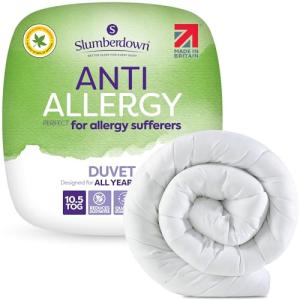When it comes to creating the perfect sleeping environment, few factors are as crucial as the comfort of your bedding. Among the various components of a comfortable bed, the duvet stands out as an essential element for achieving a good night's sleep. For allergy sufferers, choosing the right duvet can greatly enhance not only comfort but also overall health. This guide delves into the advantages of using a cozy anti-allergy duvet and how it can contribute to year-round comfort.
Understanding Anti-Allergy Duvets
Anti-allergy duvets are specially designed to resist the accumulation of allergens such as dust mites, mold, and pet dander. These allergens can trigger various allergic reactions, affecting the quality of sleep. By using hypoallergenic materials, manufacturers create duvets that minimize the risk of allergies while providing warmth and comfort.
Key Features of Anti-Allergy Duvets
| Feature | Description |
|---|---|
| Hypoallergenic Fill | Materials such as microfiber, polyester, or down-alternative are commonly used, which resist allergens. |
| Washability | Many anti-allergy duvets are machine washable, making them easy to maintain. |
| Breathability | The use of breathable materials ensures that the duvet remains comfortable across different seasons. |
| Moisture-Wicking | Advanced technology allows these duvets to wick away moisture, keeping the sleeper dry. |
| Odor Resistance | Anti-allergy duvets often include treatments to reduce odors caused by allergens and bacteria. |
Benefits of Cozy Anti-Allergy Duvets
Adopting a cozy anti-allergy duvet can lead to various benefits:
1. Improved Sleep Quality
A comfortable and allergen-free sleeping environment can lead to improved sleep quality. Sleepers often report that their breathing improves and they experience fewer interruptions during the night when using an anti-allergy duvet.
2. Enhanced Comfort
With superior insulation properties, cozy anti-allergy duvets provide warmth without excessive weight. This balanced feel allows individuals to sleep better throughout the year.
3. Reduced Allergens
These duvets are designed to repel common allergens, significantly reducing their presence in the sleeping area. Thus, allergy sufferers can often enjoy improved respiratory comfort.
4. Easy Maintenance
The washability of many anti-allergy duvets makes them easy to clean, ensuring they remain fresh and hygienic. Regular washing can further reduce the chances of allergens accumulating.
5. Versatility
Anti-allergy duvets come in different thicknesses and materials, making them suitable for all seasons. Whether it’s the chilly winter nights or the warm summer evenings, these duvets can adapt to your comfort needs.
Choosing the Right Anti-Allergy Duvet
When selecting an anti-allergy duvet, consider the following factors:
Material
- Synthetic Fillings: Offer excellent allergy resistance and are easy to wash. Good options include microfiber and polyester blends.
- Natural Fillings: Down and feather duvets may be cozy but can sometimes provoke allergies. However, treated natural fillings are available and can be suitable for some.
Tog Rating
The tog rating indicates the duvet’s thermal ability. For year-round comfort, a duvet with a tog rating of 10.5 to 13.5 is often recommended.
Size
Choose a duvet size that fits your bed comfortably. Standard sizes often include:
- Twin
- Full
- Queen
- King
Care Instructions
Always check the care instructions to ensure it can withstand regular washing, which is vital for maintaining its anti-allergic properties.
Price
There is a wide range in price for anti-allergy duvets. Balance budget and quality to find a duvet that offers great sleep experience without breaking the bank.
For those who suffer from allergies or simply want a more restful night’s sleep, investing in a cozy anti-allergy duvet can be a game changer. With numerous benefits that extend from improved health to enhanced comfort, these duvets represent a smart choice for any bedroom. As you search for your perfect duvet, keep in mind the features and factors mentioned, and you are sure to find one that meets your needs.
Frequently Asked Questions (FAQs)
Q1: Are all duvets hypoallergenic?
A1: No, not all duvets are hypoallergenic. It’s essential to specifically look for duvets labeled as anti-allergy or hypoallergenic to ensure they resist allergens.
Q2: How often should I wash my anti-allergy duvet?
A2: It is recommended to wash your duvet every 1-3 months. Regular washing helps to eliminate accumulated allergens and keeps it fresh.
Q3: Can I use an anti-allergy duvet during all seasons?
A3: Yes, many anti-allergy duvets are designed for year-round use. Choosing the right tog rating will help ensure comfort across different temperatures.
Q4: Do anti-allergy duvets provide warmth in winter?
A4: Absolutely! Many anti-allergy duvets are designed to provide adequate warmth during the winter months without excessive bulk.
Q5: What should I look for in care instructions?
A5: Consider whether the duvet is machine washable, the recommended water temperature, and any specific drying instructions to maintain its properties.
Investing in a cozy anti-allergy duvet is a step towards a healthier and more restful sleep, making it a worthwhile consideration for anyone looking to enhance their sleeping experience.






